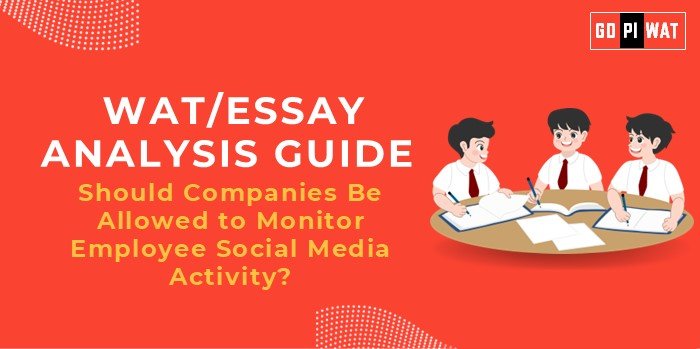📋 WAT/Essay Analysis Guide
🌐 Topic: Should Companies Be Allowed to Monitor Employee Social Media Activity?
🌟 Understanding the Topic’s Importance
The debate over monitoring employee social media reflects the intersection of technology, ethics, and corporate governance. Balancing corporate security and employee privacy is a pressing concern in today’s digital workplace.
🕒 Effective Planning and Writing
- Time Allocation:
- Planning: 5 minutes
- Writing: 20 minutes
- Review: 5 minutes
✍️ Introduction Techniques for Essays
- Contrast-Based Approach: “While monitoring social media can protect companies from reputational risks, it also raises ethical concerns about employee privacy and autonomy.”
- Solution-Oriented Approach: “With rising workplace challenges, companies need to strike a balance between protecting interests through ethical, transparent social media monitoring policies.”
📚 Structuring the Essay Body
Achievements:
- Protection against data breaches and cyber threats.
- Reduction in reputational damage through proactive monitoring.
Challenges with Comparative Analysis:
- Privacy concerns and employee morale (e.g., contrasting EU GDPR protections vs. U.S. laws allowing broader monitoring).
Future Outlook:
- Development of AI-based ethical monitoring systems.
- Strengthened laws ensuring a balance between privacy and security.
✅ Concluding Effectively
- Balanced Conclusion: “While social media monitoring is essential for protecting business interests, companies must ensure their policies are transparent, ethical, and compliant with global privacy laws.”
- Future-Focused Conclusion: “The future of workplace monitoring lies in ethical frameworks that safeguard both organizational security and employee privacy.”
📝 Sample Short Essays
Balanced Perspective (100 Words):
“Social media monitoring by companies is a double-edged sword. On one hand, it helps safeguard sensitive data, prevent reputational harm, and improve productivity. On the other hand, it risks violating employee privacy and creating distrust. Ethical monitoring policies—transparent, limited, and compliant with privacy regulations—can help organizations strike the right balance. Companies should prioritize building trust and implementing tools that focus on work-related risks without breaching employee autonomy. By fostering open communication, organizations can align employee interests with company goals while ensuring a respectful and ethical workplace environment.”
Solution-Oriented (100 Words):
“Companies need to adopt ethical monitoring practices to address growing concerns about social media misuse. Implementing AI-driven tools that only flag risks to sensitive data, coupled with employee consent and transparency, can protect organizational interests without infringing privacy. Clear communication of these policies, regular feedback, and legal compliance—such as adhering to GDPR in Europe—can help organizations maintain trust. Businesses that prioritize employee autonomy alongside security will foster stronger, more positive workplace cultures, ensuring both productivity and ethical governance in the digital age.”


